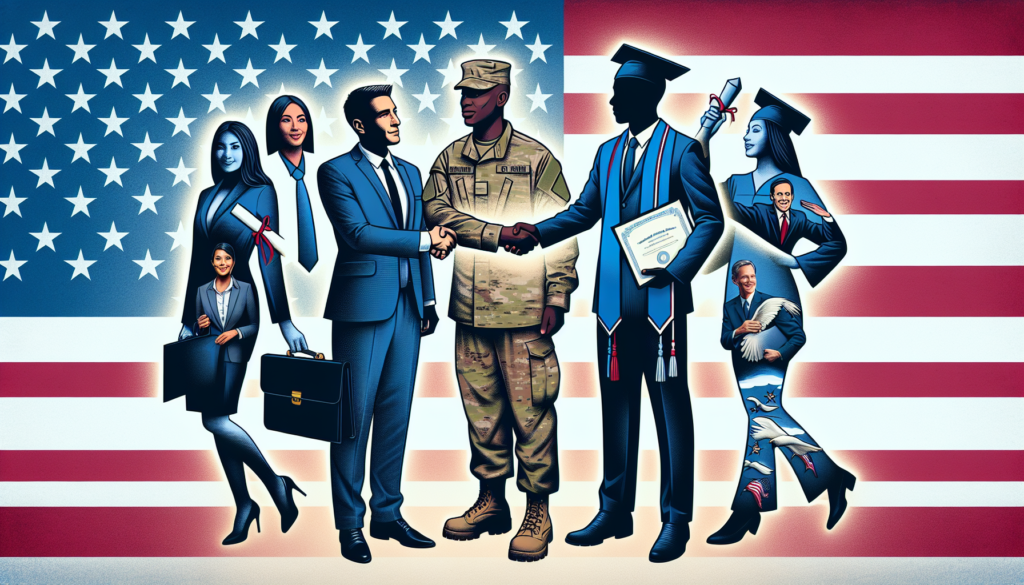Embarking on a new chapter after military service can be a formidable prospect, but it’s one filled with immense opportunity for veterans like you. “Top Careers for Veterans: Transitioning Military Experience into Civilian Success” offers a treasure trove of career paths that honor the skills and disciplines honed in uniform. Your unique experience is a coveted asset in the civilian workforce, and this guide shines a light on industries eager to welcome your expertise. Let it be your compass to a lucrative and rewarding post-service career, where your potential for growth knows no bounds and your transition is supported by a wealth of resources designed with your success in mind.

Translating Military Skills into Civilian Language
Identifying Transferable Skills
You’ve honed many skills during your time in the military that civilian employers find invaluable. Critical thinking, leadership, teamwork, and a strong work ethic are just a few attributes that you bring to the table. It’s imperative to identify these transferable skills and understand how they can apply to various roles in the civilian sector. Take inventory of your responsibilities, achievements, and training to make a list of your capabilities that are attractive to civilian employers.
Building a Civilian Resume
Crafting a civilian resume can initially seem daunting. You need to translate military jargon into language that resonates with civilian hiring managers. Instead of military acronyms or codes, describe your experiences with universally understood terms. Highlight your accomplishments, such as leadership roles or projects you’ve led, and quantify them wherever possible. For instance, “managed logistics for transportation of equipment valued at $2M” clearly demonstrates your responsibilities and trustworthiness.
Effectively Communicating Experience
In interviews and networking opportunities, you’ll need to articulate your experiences compellingly. Practice explaining your military roles as they relate to the job you’re seeking. Offer concrete examples of how you solved problems, led teams, and managed projects. Helping potential employers see the relevance of your military service to their organization is key to a successful transition.
Government Jobs
Veterans Preference in Hiring
In the civilian workforce, your status as a veteran can work to your advantage, particularly in government jobs. Federal agencies offer a Veterans Preference system that gives eligible veterans preference over non-veteran candidates. Understanding how to leverage this benefit can significantly enhance your job prospects.
Security Clearance Advantages
If you already have security clearance from your time in the service, it’s a valuable asset. Many government positions require clearance, and having it in advance can save employers time and money, making you a more attractive candidate.
Civil Service Opportunities
The civil service offers a variety of roles where your military discipline and mission-oriented approach are highly prized. From administrative positions to emergency management roles, there are diverse opportunities to serve your country as a civilian.
Federal, State, and Local Positions
Beyond the federal level, consider state and local government positions. Many communities have a strong demand for veterans with leadership, planning, and communication skills. Research the various positions available in government at all levels to find one that aligns with your expertise.
Defense Contracting
Leveraging Security Clearance
In defense contracting, your security clearance is a golden ticket. Defense contractors often work closely with military and government agencies, and your clearance can get you exclusive access to high-level projects, often with lucrative pay.
Roles in Project Management
Your military service probably involved command and coordination, which are critical in civilian project management. Defense contractors value veterans for their experience managing complex missions under challenging conditions.
Working with Military Technology
Having firsthand experience with military hardware gives you a unique edge. Defense contractors need experts who understand the technology, can communicate with military clients, and can oversee the development of new tech.
Intelligence and Analysis Positions
For those of you who worked in intelligence, your analytical skills are highly sought after by defense contractors who provide analysis services to government clients.
Information Technology & Cybersecurity
Certifications and Qualifications
Many military roles involve sophisticated technology, providing a foundation for IT & cybersecurity careers. Civilian certifications like CompTIA Security+ or Certified Information Systems Security Professional (CISSP) can complement your military training and make your skills marketable.
Roles in Cyber Defense
Your military background likely involved some level of cyber defense. These skills translate into civilian roles that protect organizations from cyber threats, something increasingly vital across all industries.
Veteran-Friendly IT Companies
Research companies that have veteran-friendly hiring practices and programs. These organizations value your military experience and may offer additional support as you transition.
Transitioning from Military IT to Civilian Sectors
Moving from military IT to a civilian career can be smooth if you’re well-prepared. Showcase your ability to adapt and apply your robust technical skills in new environments.

Law Enforcement
Transition from Military Police to Civilian Law Enforcement
If you’ve worked in military police or security, your skills are directly transferrable to civilian law enforcement. Tailor your resume to highlight your relevant training, such as weapons expertise and law enforcement protocols.
Federal Law Enforcement Agencies
Federal law enforcement agencies, such as the FBI, DEA, and Homeland Security, often seek out veterans for their discipline and investigatory skills.
Roles in Investigation and Security
Beyond typical police work, your skills are well-suited for roles in private security, investigations, and even forensics. Your attention to detail and procedural knowledge can set you apart in these fields.
State and Local Police Departments
Do not overlook opportunities in state and local police departments. Many have express pathways for veterans, valuing the experience and perspective you bring to community policing.
Healthcare and Medical Services
From Combat Medic to Civilian Healthcare
Combat medics have skills that are urgently needed in civilian healthcare. Certifications for emergency medical technicians (EMTs) or paramedics can be additional steps to build upon your military medical experience.
Jobs in Nursing and Emergency Medical Services
Your background may prepare you well for nursing or other emergency medical services. Many healthcare organizations actively recruit veterans for their proven ability to perform under pressure.
Veteran Opportunities in Health Administration
If you were involved in healthcare administration in the military, similar roles exist in the civilian sector. Hospitals and clinics need organized, decisive leaders like you.
Careers in Medical Technology and Research
Your experience with medical technology in the field can lead to careers in the rapidly evolving areas of medical research and development.
Education and Training
Using GI Bill for Education Careers
Use your GI Bill benefits to pursue degrees or certifications in education. You can bring a unique perspective to teaching, especially in disciplines like history or political science where your military experience provides you with firsthand insights.
Positions in Educational Administration
Your organizational skills and experience in training others can make you an excellent candidate for roles in educational administration.
Instructor Roles for Technical Skills
Consider becoming an instructor if you have specialized technical skills. Teaching the next generation of tradespeople or technicians can be a rewarding way to share your knowledge.
Supporting Other Veterans in Educational Pursuits
You understand the veterans’ educational journey better than most. Roles in veteran support services within educational institutions can be an impactful way to give back to your community.
Aerospace and Aviation
Commercial Piloting Post-Military
If you served as a pilot in the military, you could transition to a commercial flying career. Civilian certification, while necessary, can build on your extensive flight experience.
Aircraft Maintenance and Operation
Your technical skills in aircraft maintenance are highly marketable in the civilian workforce, with airlines and private aviation companies seeking experienced technicians.
Careers in Space Technology
The burgeoning space industry offers new opportunities, particularly for those with a background in aviation or aerospace. Your military experience will serve you well in this cutting-edge field.
Management Positions in Aviation Companies
Consider management roles in aviation-related companies, where your leadership and organizational expertise from the military can drive success.
Logistics and Supply Chain Management
Utilizing Military Organization Skills
Your military background likely includes logistics, making you a solid candidate for careers in supply chain management. Everything from inventory management to operations requires meticulous organization, a skill you have mastered.
Roles in Warehouse Management
Warehouses require disciplined oversight and efficient systems, which mirrors the logistics demands of the military.
Transport and Distribution Careers
Your experience with the transport and distribution of materials in the military is directly applicable to civilian careers in these areas.
Procurement and Inventory Control Jobs
Skills learned in the military managing supplies and procuring equipment make you well-suited for procurement and inventory control positions.
Work-Life Balance and Continued Support
Managing Transitions with Family
As you make the transition to civilian life, remember to involve your family in the process. Their support and understanding are crucial as you adapt to a new way of living and working.
Accessing Mental Health Resources
It’s important to prioritize your mental health during this period of change. Take advantage of available resources for veterans to support your wellbeing.
Building a New Community
Connecting with other veterans and civilian peers can help you build a strong support network in your new career. Look for local community groups or online forums for veterans in your chosen industry.
Pursuing Work that Aligns with Personal Values
Finally, seek out a career that aligns with your values and passions. You’ve served with honor, and now your skills and experiences can lead you to a fulfilling civilian career that continues the tradition of service in a new way.
